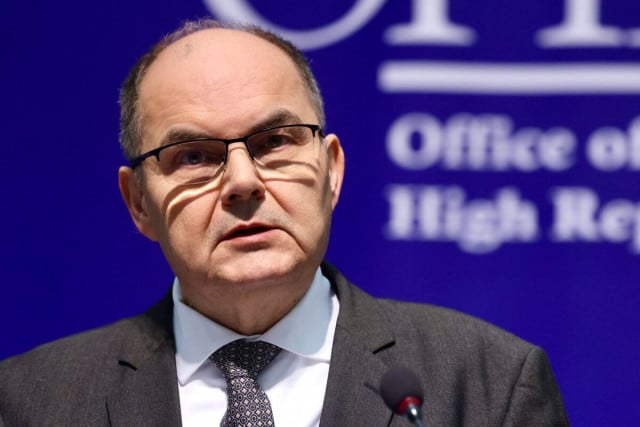UN Security Council Tackles Bosnia's Political Crisis
A report submitted to the UN Security Council outlines serious threats to Bosnia's sovereignty, with grave accusations against Republika Srpska's leaders.
Published May 16, 2024 - 00:05am

Image recovered from hercegovina.info
High Representative in Bosnia and Herzegovina, Christian Schmidt, accuses the authorities of Republika Srpska (RS), led by RS President and leader of SNSD Milorad Dodik, of actively undermining the state of Bosnia and Herzegovina (BiH), its competences, and institutions, thereby challenging the Dayton Agreement. Such allegations have been part of his recent report to the UN Security Council, sparking significant concern over the stability of the country.
In the period from October 16th to April 15th, while there was progress towards European Union integration, unprecedented attacks on the General Framework Agreement for Peace were also reported. Schmidt emphasized a European Council decision to open accession negotiations with BiH, a move that marks a major milestone for the country's opportunities. However, the undermining of state institutions by the RS authorities, including threats to obstruct the work of state organs and unilateral withdrawal from the constitutional, legal, and institutional framework of BiH, raises the specter of creating a parallel framework for RS, potentially leading to the de facto, if not de jure, dissolution of BiH.
Furthermore, Schmidt reported systematic pressure on judicial institutions, promoting the abolition of the State Court and Prosecutor's Office of BiH, undermining the Constitutional Court of BiH, and continuous challenges to the institution and mandate of the High Representative. The contested narrative by RS authorities, coupled with their legislative initiatives which restrict civic spaces and threaten to discourage and penalize political dissent, suggests a grim scenario with dire consequences if unchecked.
The report mentions regression in public efforts to confront the past and alarming levels of ethnic-nationalist revisionism, genocide denial, and glorification of war criminals. These trends, closely linked to the general decline of democracy, human rights respect, and rule of law, have exacerbated societal distrust and polarization, notably deteriorating inter-community relations in Srebrenica in the last two years.
The High Representative stressed the importance of international support for BiH's path to sustainable peace and highlighted the risk of political instability due to ongoing tensions. Amidst the issue of election corruption and irregularities, Schmidt has made a critical decision to amend the BiH Election Law to reinforce election integrity. Nonetheless, a considerable number of violent and provocative incidents against returnees contribute further to insecurity among this population, underlining the need for cohesive efforts to uphold democratic processes, EU aspirations, and peace in the country.
The situation in Bosnia and Herzegovina remains precarious, with the High Representative's report delineating a complex web of political, legal, and societal challenges that could compromise peace and stability in the region. Despite the notable step towards European integration, Christian Schmidt has underscored an increasingly volatile atmosphere, fueled by Republika Srpska's leadership and initiatives.
While RS President Milorad Dodik asserts that these actions are an exercise in autonomy and self-determination, the undermining of the state structures is a matter of serious international concern. Such unilateral actions not only contravene obligations arising from the General Framework Agreement for Peace, instituted in Dayton, but also jeopardize the extensive work undertaken by the international community and local parties to consolidate peace and foster cooperation post-conflict.
This contested dynamic has seen international actors and domestic critics express apprehension about the region's prospects for peace. The EU itself, committed to the region's stability and prosperity, has expressed its unease with the potentially destabilizing impacts of RS's actions. This is especially pertinent given the EU's vested interest in the Western Balkans, of which Bosnia and Herzegovina is a crucial part due to its strategic positioning and the role it plays within the broader geopolitical landscape.
The interconnected challenges of confronting the past and addressing current tensions are also evident in the political arena. Recent elections have been tarnished by allegations of misconduct, thereby undermining faith in democratic institutions. Schmidt's amendments to the Election Law aim to safeguard against these abuses, but the efficacy of these measures remains to be tested in future elections. The shadow of election corruption looms large, underscoring the critical need for transparency and robust legal and regulatory frameworks.
In addition to the political and legal concerns, societal schisms are increasingly pronounced, with incidents of ethnic violence and provocative acts against ethnic returnees spotlighting the fragility of the reconciliation process. The High Representative's report points to the urgent necessity for reconciliation initiatives that actively promote inter-communal understanding and address the root causes of division. Adequate protection and support for returnees are essential to ensure not only their safety but also to set a precedent for inclusivity and tolerance.
Civil society in Bosnia and Herzegovina is also intimately affected by these challenges. The space for civic engagement is shrinking as legislative initiatives encroach upon fundamental freedoms. Encouraging open dialogue and protecting the rights of citizens to peaceful assembly and free speech are indispensable for nurturing a democratic culture and countering the autocratic tendencies displayed by some political leaders in the country.
As international focus on Bosnia and Herzegovina intensifies, the role of external actors becomes even more critical. It is imperative for regional and global stakeholders, such as the EU, the United States, and other international partners, to work continuously towards ensuring that Bosnia and Herzegovina remains on the path of peace and does not succumb to the forces that seek to divide it. A collaborative approach, which includes diplomatic pressure, mediation, and, where appropriate, sanctions, may be necessary to dissuade further destabilizing action from RS authorities.
The coming months will be telling for the future of Bosnia and Herzegovina as it grapples with heightened nationalistic rhetoric and action that threatens to undo decades of peace work. The international community must uphold its commitment to the principles of the Dayton Agreement in order to preserve Bosnia and Herzegovina's unity and to motivate all parties involved to persist in their journey towards European integration and democratic consolidation.







